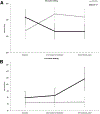ADSTEP: Preliminary Investigation of a Multicomponent Walking Aid Program in People With Multiple Sclerosis
- PMID: 29958906
- PMCID: PMC6948105
- DOI: 10.1016/j.apmr.2018.05.023
ADSTEP: Preliminary Investigation of a Multicomponent Walking Aid Program in People With Multiple Sclerosis
Abstract
Objective: To evaluate the effect of the Assistive Device Selection, Training and Education Program (ADSTEP) on falls and walking and sitting activity in people with multiple sclerosis (PwMS).
Design: Randomized controlled trial.
Setting: Veterans affairs medical center.
Participants: PwMS (N=40) using a walking aid at baseline who had fallen in the previous year.
Interventions: Participants were randomly assigned to ADSTEP or control. ADSTEP had 6 weekly, 40-minute, 1-on-1 sessions with a physical therapist, starting with walking aid selection and fitting, followed by task-oriented progressive gait training. Control was usual medical care with the option of ADSTEP after the study.
Main outcome measures: The following were assessed at baseline, intervention completion, and 3 months later: falls, timed Up and Go, timed 25-foot walk, 2-minute walk, Four Square Step Test, International Physical Activity Questionnaire, Quebec User Evaluation of Satisfaction with Assistive Technologies, Multiple Sclerosis Walking Scale-12, Activities-Specific Balance Confidence Scale, and Multiple Sclerosis Impact Scale-29. Effect on these outcomes was estimated by a 2-by-2 repeated measures general linear model.
Results: Fewer ADSTEP than control participants fell (χ2=3.96, P<.05. number needed to treat =3.3). Time spent sitting changed significantly differently with ADSTEP than with control from baseline to intervention completion (F=11.16, P=.002. ADSTEP: reduced 87.00±194.89min/d; control: increased 103.50±142.21min/d; d=0.88) and to 3-month follow-up (F=9.25, P=.004. ADSTEP: reduced 75.79±171.57min/d; control: increased 84.50±149.23min/d; d=0.79). ADSTEP yielded a moderate effect on time spent walking compared to control at 3-month follow-up (P>.05. ADSTEP 117.53±148.40min/d; control 46.43±58.55min/d; d=0.63).
Conclusions: ADSTEP prevents falls, reduces sitting, and may increase walking in PwMS.
Trial registration: ClinicalTrials.gov NCT02408718.
Keywords: Accidental falls; Multiple sclerosis; Physical activity; Randomized controlled trial; Rehabilitation; Walking.
Published by Elsevier Inc.
Figures


Comment in
-
Critically appraised paper: Task-oriented gait training that focuses on the safe and correct use of a walking aid may reduce falls in people with multiple sclerosis [commentary].J Physiother. 2020 Jan;66(1):56. doi: 10.1016/j.jphys.2019.10.006. Epub 2019 Nov 9. J Physiother. 2020. PMID: 31718961 No abstract available.
-
Critically appraised paper: Task-oriented gait training that focuses on the safe and correct use of a walking aid may reduce falls in people with multiple sclerosis [synopsis].J Physiother. 2020 Jan;66(1):56. doi: 10.1016/j.jphys.2019.10.004. Epub 2019 Dec 13. J Physiother. 2020. PMID: 31843429 No abstract available.
Similar articles
-
A walking aid selection, training, and education program (ADSTEP) to prevent falls in multiple sclerosis: A randomized controlled trial.Mult Scler. 2024 Aug;30(9):1205-1215. doi: 10.1177/13524585241265031. Epub 2024 Aug 5. Mult Scler. 2024. PMID: 39104170 Clinical Trial.
-
Neuroplasticity of the sensorimotor neural network associated with walking aid training in people with multiple sclerosis.Mult Scler Relat Disord. 2019 Jun;31:1-4. doi: 10.1016/j.msard.2019.03.004. Epub 2019 Mar 8. Mult Scler Relat Disord. 2019. PMID: 30875527 Free PMC article. Clinical Trial.
-
Balance exercise program reduced falls in people with multiple sclerosis: a single-group, pretest-posttest trial.Arch Phys Med Rehabil. 2014 Dec;95(12):2428-34. doi: 10.1016/j.apmr.2014.06.016. Epub 2014 Jul 6. Arch Phys Med Rehabil. 2014. PMID: 25004466 Clinical Trial.
-
Exercise as a therapy for improvement of walking ability in adults with multiple sclerosis: a meta-analysis.Arch Phys Med Rehabil. 2015 Jul;96(7):1339-1348.e7. doi: 10.1016/j.apmr.2015.02.011. Epub 2015 Feb 21. Arch Phys Med Rehabil. 2015. PMID: 25712347 Review.
-
Treadmill training may be an effective form of task-specific training for improving mobility in people with Parkinson's disease and multiple sclerosis: a systematic review and meta-analysis.Physiotherapy. 2019 Jun;105(2):174-186. doi: 10.1016/j.physio.2018.11.007. Epub 2018 Nov 15. Physiotherapy. 2019. PMID: 30876717
Cited by
-
Evaluation of a web-based fall prevention program among people with multiple sclerosis.Mult Scler Relat Disord. 2019 Jun;31:151-156. doi: 10.1016/j.msard.2019.04.015. Epub 2019 Apr 13. Mult Scler Relat Disord. 2019. PMID: 31004969 Free PMC article. Clinical Trial.
-
Outcome measures used in trials on gait rehabilitation in multiple sclerosis: A systematic literature review.PLoS One. 2021 Sep 30;16(9):e0257809. doi: 10.1371/journal.pone.0257809. eCollection 2021. PLoS One. 2021. PMID: 34591875 Free PMC article.
-
The Multiple Sclerosis Centers of Excellence: A Model of Excellence in the VA.Fed Pract. 2020 Apr;37(Suppl 1):S6-S10. Fed Pract. 2020. PMID: 32341632 Free PMC article. No abstract available.
-
Trekking Poles to Aid Multiple Sclerosis Walking Impairment: An Exploratory Comparison of the Effects of Assistive Devices on Psychosocial Impact and Walking.Int J MS Care. 2021 May-Jun;23(3):135-141. doi: 10.7224/1537-2073.2020-064. Epub 2021 Jun 21. Int J MS Care. 2021. PMID: 34177386 Free PMC article.
-
Interventions for preventing falls in people with multiple sclerosis.Cochrane Database Syst Rev. 2019 Nov 28;11(11):CD012475. doi: 10.1002/14651858.CD012475.pub2. Cochrane Database Syst Rev. 2019. PMID: 31778221 Free PMC article.
References
-
- Zwibel HL. Contribution of impaired mobility and general symptoms to the burden of multiple sclerosis. Adv Ther 2009;26:1043–57. - PubMed
-
- Sutliff MH. Contribution of impaired mobility to patient burden in multiple sclerosis. Curr Med Res Opin 2010;26:109–19. - PubMed
-
- Larocca NG. Impact of walking impairment in multiple sclerosis: perspectives of patients and care partners. Patient 2011;4:189–201. - PubMed
-
- Cameron MH, Poel AJ, Haselkorn JK, Linke A, Bourdette D. Falls requiring medical attention among veterans with multiple sclerosis: a cohort study. J Rehabil Res Dev 2011;48:13–20. - PubMed
-
- Matsuda PN, Shumway-Cook A, Bamer AM, Johnson SL, Amtmann D, Kraft GH. Falls in multiple sclerosis. PM R 2011;3: 624–32. - PubMed
Publication types
MeSH terms
Associated data
Grants and funding
LinkOut - more resources
Full Text Sources
Other Literature Sources
Medical

